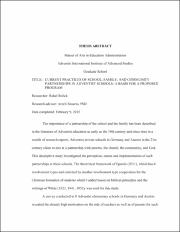| dc.description.abstract | The importance of a partnership of the school and the family has been described
in the literature of Adventist education as early as the 19th century and since then in a
wealth of research reports. Adventist private schools in Germany and Austria in the 21st
century claim to aim at a partnership with parents, the church, the community, and God.
This descriptive study investigated the perception, nature and implementation of such
partnerships at these schools. The theoretical framework of Epstein (2011), which has 6
involvement types and enriched by another involvement type cooperation for the
Christian formation of students which I added based on biblical principles and the
writings of White (1923, 1941, 1952), was used for this study.
A survey conducted in 8 Adventist elementary schools in Germany and Austria
revealed the already high motivation on the side of teachers as well as of parents for such
partnerships. This high motivation led to the formation of informal partnerships among
parents and teachers. Parents showed an interest in the students’ learning and well-being
and were willing to volunteer and support the school in various ways. Several partnership
practices had already naturally emerged such as regular communication, volunteer
involvement, and worship services in cooperation with the local church. However,
partnership activities were not purposely planned or guided. Limited resources,
particularly time constraints, seemed to challenge the partnership process at these
schools. The results on the involvement type cooperation for the Christian formation of
students were particularly high. One of the areas of partnership that were not yet
developed to their full potential was the involvement type learning at home.
In this program, a field-wide cooperation of schools is suggested. Already
existing as well as new practices for partnership are incorporated for yearly
implementation and evaluation. Suggested features of the partnership program include
holding regular parent meetings to discuss parenting topics, giving regular interactive
homework (Teachers Involve Parents in Schoolwork) that integrates faith and learning,
and involving parent representatives in the partnership process. An implementation phase
of 3 years is suggested and described in this study. Among the recommendations for
these schools are a field-wide interschool cooperation, a continuation of the spiritual
emphasis of the curriculum, the development of interactive homework, and the
development of parent networks. | en_US |

